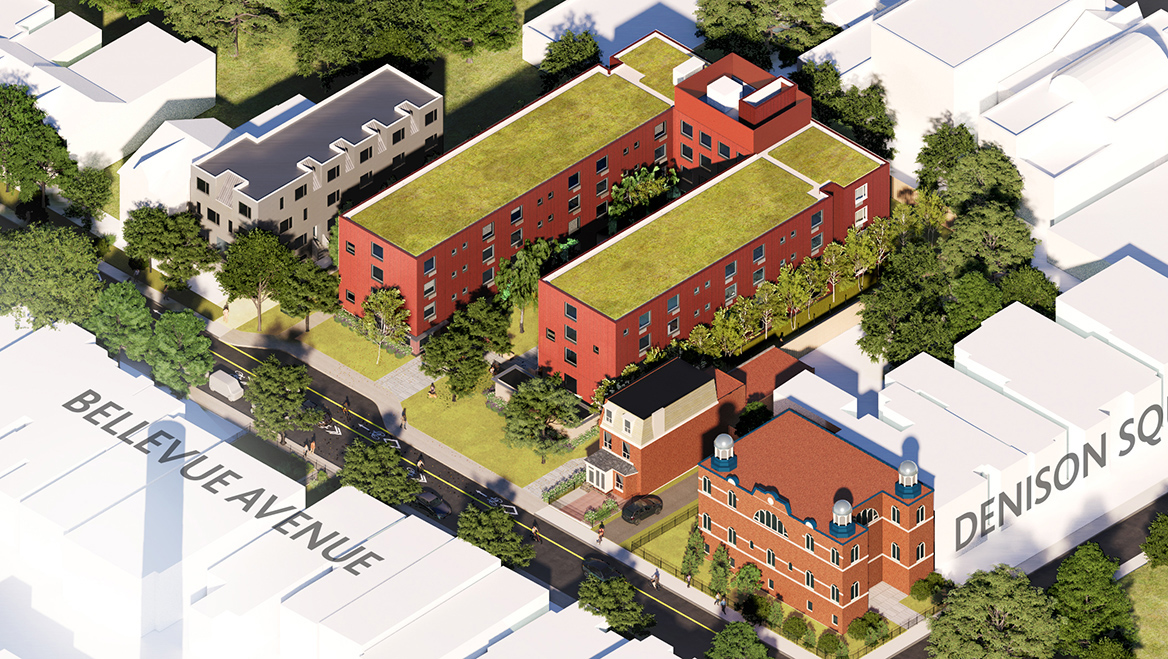June 5, 2025
For one Canadian city, home is where the parking is, or, more accurately, was.
Toronto has been listed as one of the least affordable cities in North America, with housing costs growing four times more than income in recent years. To combat its housing crisis, the city council started working with local community land trusts — nonprofit organizations that buy and maintain land to ensure the affordability of historic and older neighborhoods — to find possible solutions.
One recent initiative approved a project to turn a municipal-owned parking lot into affordable housing that will welcome residents this fall.
From drive-in to move-in ready
The idea to turn a parking lot in the heart of the historic Kensington Market neighborhood at 35 Bellevue Avenue began back in 2017 after the Kensington Market Community Land Trust (KMCLT) filed a petition. Progress takes time, though, and as promises to develop the site fell through over the years, the site remained a place for automobiles, not people.
It wasn't until Mayor Olivia Chow took office in July 2023 that funding became available and the project revved up. This followed her announcement about building 65,000 new rent-controlled homes in response to the city's growing housing crisis.
The 35 Bellevue Avenue plan calls for a four-story apartment building with about 78 units. It will be built using mass timber that has a lower carbon footprint than other construction materials and aims to meet the city's TransformTO Net Zero Strategy sustainability goals, which seek to reduce Toronto's greenhouse gas emissions by 2040.

Features of the 35 Bellevue Avenue multi-family housing plan include an internal courtyard with trees, a patio with seating, and a covered bicycle storage area. Renderings by Montgomery Sisam Architects Inc.

The building meets Toronto's TransformTO Net Zero Strategy requirements by using a mass timber structure, air-source heat pumps for heating and cooling, and energy-efficient appliances.
Between 1984 and 2018, only 8.5 percent of units categorized as affordable housing were below 80 percent of average market rent, according to analysis from 2022. This project plans to cap rents to 30 percent of residents' incomes.
"In the community land trust model, we're solely committed to long-term affordable housing, so rents will be capped at a certain amount indefinitely," says Kevin Barrett, a KMCLT board member. "Many times, affordable housing built within the private housing scheme is only affordable in the short term, before the costs spike and the landlords raise the rent."
The city chose KMCLT and the St. Clare's Multifaith Housing Society to manage the property once construction is completed. Barrett says the project will provide mental health services and aid to its new residents, including frequent check-ins and access to support free of charge. "Some people had been at risk of homelessness, or actually homeless for years," he says. Currently, estimates say about 13,000 people experiencing homelessness are living in the city's shelters. "So, it's a big shift back to normal life that requires support and mental health services."
Aside from providing relief to people experiencing homelessness, the plan for the apartment building is to integrate it seamlessly into the larger Kensington Market neighborhood. "The proposal respects and reinforces the physical character of Bellevue Avenue, which is generally comprised of low-rise buildings with a varied front yard setback," says Mercedeh Madani, the city's director of housing policy and strategy. This design tracks with the neighborhood's reputation as a vibrant area, made up of many cultures, including Jewish, Chinese, and Filipino communities.
With cities across the world experiencing a lack of attainable housing, governments working with land trusts can provide a community-driven effort to spur housing while protecting neighborhoods from private developers and gentrification. "Affordable housing is best delivered when different levels of government work with nonprofit and community housing partners toward a common goal: housing for all," says Madani.




